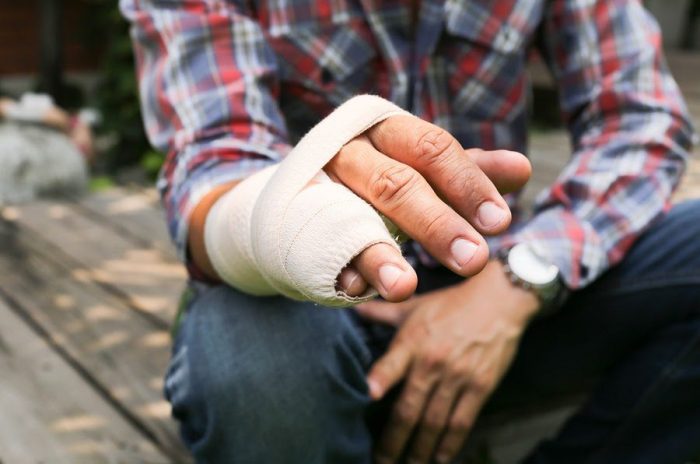
Guidelines for Suing for Personal Injury and Suffering

What are Pain and Suffering Damages?
Pain and suffering damages are a kind of legal remedy issued in relation to various personal injury claims. They are intended to compensate the victim for the losses related to their personal injury. The term “pain and suffering” is broad in nature and it is difficult to define it. It can include:
- Neck and joint pain caused by whiplash and other types of car accident injuries
- Nerve damage caused by a faulty surgical procedure
- Emotional conditions resulting from a trauma
- Grief over the loss of a loved one
Proving pain and suffering sometimes requires the testimony of a psychology expert t act as the main witness. The laws controlling pain and suffering damages can vary according to jurisdiction.

When are Pain and Suffering Damages Awarded?
In general, the more the pain and sufferings are related to the injuries, the better are the chances that the plaintiff will recover the damages. In some cases, the pain and suffering damage is included in the overall estimation of general damages issued to the person. In other cases, pain and suffering can be included in the “compensatory damages” to compensate for the person’s losses like medical expenses and lost wages.
Pain and suffering damages generally should be real and not the imaginary one, especially for the damage awards that covers the emotional “pain/suffering” aspect. Pain and suffering leading to the additional physical injuries are more likely to result in the damages award.
However, there are many states that impose limits on damages for pain or suffering claims.
What are Some Guidelines When Suing for Pain or Suffering?
When filing a lawsuit which involves pain or suffering damage, you should follow these guidelines:
- Try to be as specific as possible whenever presenting your condition- vague situations that cannot be proven because they will most certainly not be awarded.
- Make a log of your injuries before and after the incident- this will enable you to determine how your pain and sufferings are related to incidents, whether it is a slip and fall case, car accident, or other kinds of personal injuries.
- Keep all written legal documents, like medical receipts/bills, police reports, wage stumps, and other documents which can be used as evidence.

Punitive Damages in Personal Injury Cases
In cases where the defendant’s conduct is deemed particularly, outrageously, careless or egregious, a personal injury plaintiff can be awarded on punitive damages on top of any compensatory damages compensation. Punitive damages stem from the rationale which is quite different from the justification tied to the compensatory damages.
Punitive damages are given to the injured plaintiff, however, the real goal of such kinds of damages is to punish the defendant for their conduct — to– hit them in the pocketbook– so to speak and to act as a deterrent. Since it is not unusual for punitive damage compensation to top tens of millions of dollars, most states have set some kind of cap on the punitive damage awards in cases of personal injury.
General Types of Incidents & Legal Claims
| Type of Case | Cause of Action | Liable Party | Source of Compensation |
| Car Accident | Driver’s Negligence | At-fault driver (except in “no-fault” states) | Insurance Claim/Civil Lawsuit |
| Slip and Fall (Premises Liability) | Property Owner’s Negligence | Property owner | Insurance Claim/Civil Lawsuit |
| Medical Malpractice | Medical Negligence | Doctor/medical professional, hospital/medical facility, or both | Insurance Claim/Civil Lawsuit |
| Workplace Accident | None | None, fault is not necessary | Workers Compensation Claim (No Lawsuit Possible) |
| Defective Product | Strict Liability | Product manufacturer | Civil Lawsuit/Class Action Lawsuit |
| Assault and/or Battery | Intentional Tort | Aggressor/perpetrator | Civil Lawsuit (Insurance policies do not typically cover intentional acts) |
| Animal Attack/Dog Bite | Owner’s Negligence (Strict Liability in Some States) | Animal owner | Civil Lawsuit/[Homeowners] Insurance Claim |

Do I Need a Lawyer for Help When Suing for Pain and Suffering?
Pain and suffering damages are only issued under specific circumstances. So it is in your best interest to hire a lawyer if you need help filing the lawsuit for any personal injury issue. Your attorney will represent you in the courtroom and will provide the legal expertise needed when proving the damages. Also, your attorney will assist you in the event that you need to file any motion regarding the damages award.
More in Legal Advice
-
What Is Asylum & How Does It Work?
At its core, asylum is a protection granted to foreign nationals in a country because they have suffered persecution or have...
November 26, 2023 -
6 Reasons Why Sentencing Is Any Judge’s Toughest Assignment
When you picture a judge, you might imagine a stern figure in black robes, gavel in hand, delivering verdicts with unwavering...
November 14, 2023 -
Carrie Underwood Sued for NBC Sunday Night Football’s “Game On”
It is almost ritualistic. As the weekend winds down and Sunday evening approaches, millions across America gear up for a night...
November 12, 2023 -
Why Lawyers’ Productivity Has Increased in Modern Times
Remember the old days when your image of a lawyer might have been drawn straight out of an episode of “Matlock”...
November 5, 2023 -
Paying Down Debts Using Debt Relief Tactics
Debt is like that lingering headache that never seems to go away, no matter how much aspirin you pop. But there...
October 29, 2023 -
Pro Se: Your Right to Represent Yourself WITHOUT an Attorney
The legal system is complex and so, more often than not, people hire a professional attorney to navigate the legal system....
October 21, 2023 -
The Craziest, Most Expensive Hollywood Divorces of All Time
Hollywood is the land of glitz, glamour, and romance – until it is not. Over the years, we have seen our...
October 13, 2023 -
How Was Life as a Lawyer in Ancient Rome?
The Late Roman Republic was a period chock-full of political drama, rampant corruption, and the rise and fall of powerful figures....
October 8, 2023 -
7 Critical Things to Know Before Hiring an Elder Law Attorney
Hiring an attorney can feel like a daunting task. When the need pertains to elder law, emotions run high, often making...
October 1, 2023














